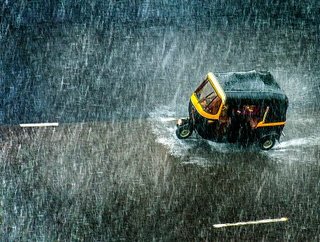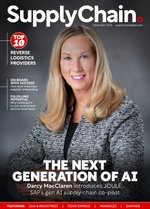Extreme weather prompts supply chain action at Mondelēz

Climate change is becoming a bigger problem by the year for those who have to manage risk in supply chains.
A recent Harvard Business Review study suggests just 11% of suppliers are fully prepared for weather-related disruption. The study also found half (49%) of surveyed US companies had experienced an increase in climate volatility, with this figure jumping in China and Taiwan to a massive 93%.
Extreme weather events are a global phenomenon and are becoming more problematic. As climate change gathers pace, we are set to face more-frequent and severe extreme weather events, including hurricanes, tsunamis, forest fires, and floods. Inevitably, these will interrupt production, increase sourcing costs, and cut into corporate revenue.
Here, we speak to Cloris Zhang, SVP of Integrated Supply Chain, AMEA, at multinational snacks giant, Mondelēz International. The company owns iconic global and local brands such as Oreo, Ritz, LU, Clif Bar and Tate's Bake Shop biscuits and baked snacks, as well as Cadbury Dairy Milk, Milka and Toblerone chocolate.
Zhang speaks about the impact climate change is having on the company’s operations in the APAC region.
What extreme weather is affecting the APAC region?
We have seen a rise in extreme weather events in many markets, including floods in Australia, Thailand and India. It has impacted the supply chain in a big way.
With global supply chains disruptions in one area can create a ripple effect globally. The floods in Australia last year impacted the local logistics industry causing significant delays in our product delivery to customers. The floods in Thailand caused hard-disk supply shortages globally and eventually caused our new-equipment fabrication delay. This underscores the importance of building greater end-to-end resilience in our supply chains, which is a key priority for us at Mondelēz.
How is extreme weather affecting operations?
We have an extensive supply chain operation in APAC catering to consumers in 70 markets, including manufacturing sites and RDQI Technical Centres. Weather events such as floods, severe storms and drought that are partially caused – or exacerbated by – climate change have the potential to disrupt our business operations, our suppliers, our external manufacturing partners, distributors or other business partners.
How do you minimise disruption from extreme weather?
We are investing in digital and technology innovations to build responsive, scalable supply chains that allow our business to stay ahead of new snacking trends and deliver snacks even during challenging times.
We have established our first data-driven and remotely operated lights-out factories in manufacturing, with a focus on stability, productivity, and predictability.
Our Sri City factory in India is a certified World Economic Forum Lighthouse plant. Here we deploy end-to-end digitalisation, predictive analytics, AI and automation to increase labour productivity and reduce manufacturing costs. This allows us to have real-time visibility on plant operations, which enables much faster reaction in the case of emergency.
We have similar supply chain operations in Suzhou, China, including two plants and two distribution centres. These have reduced lead times by 32%, which improves the resilience of the end-to-end supply chain, which was proven during COVID.
Another key focus for us is to build a stronger business contingency plan. The challenges we face are not only extreme weather but we have to qualify back-up suppliers, build multi-sourcing capability across plants and develop an agile, multi-skilled operation team.
How are you future-proofing APAC operations against extreme weather events?
Firstly, we're strengthening our supplier partnerships. We work closely with our partners to streamline processes for cost efficiencies, to measure their performance, and to diversify our supplier network.
We're also using machine learning-driven statistical forecasting to improve accuracy in forecasting, to enhance customer service, to optimise inventory performance, and to reduce waste.
For instance, in India, we’ve launched a pilot program to install IoT devices in our product transportation trucks. This allows us to track their movements and monitor temperatures inside the vehicles, ensuring complete traceability throughout our cold chain.
How are you cutting carbon emissions across operations?
Most importantly, we embed sustainability into our operations and supply chains to drive innovative, more sustainable growth the right way for people and the planet.
Globally, we have committed to a target of net zero greenhouse gas emissions across our full value chain by 2050. We align our plans with the Science Based Targets initiative (SBTi), and take an end-to-end approach to ensure that we are using natural resources more efficiently and renewably in our operations
We address the carbon footprint of our operations through initiatives that promote the use of renewable energy and measures for energy efficiency.
Our manufacturing plants across South Asia, China and Southeast Asia are powered by renewable energy sources such as solar or biogas. Two sites in India now secure 100% of their electricity from renewable sources, while our sites in Malaysia, Indonesia and Thailand are now consuming between 20% and 33% of their electricity from renewable sources.
Our Reduce, Reuse and Recycle strategy extends to supply chain logistics management practices. Our owned and third-party warehouses are powered by renewable energy which reduces our emissions from these facilities.
We also manage our water and waste as effectively as possible. In line with our goals to reduce water use, we support initiatives throughout our value chain to conserve water.
In India, we succeeded in saving approximately 29,000 m3 of water in the manufacturing process and additionally harvested 98,000 m3 of rainwater. We reduce the contribution of packaging to our carbon footprint by designing for circularity and making our packaging light and right.







